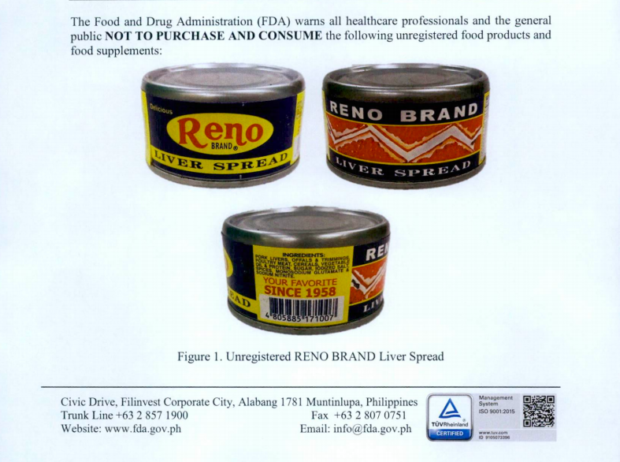
This is part of the advisory issued by the Food and Drug Administration, which informed the public to refrain from buying products the agency mentioned in its advisory due to unregistered food and food supplement products. Source: FDA
MANILA, Philippines — A popular liver spread brand must first secure the “required authorization” from the Food and Drug Administration (FDA) before it can be allowed again in the Philippine market, the agency said Thursday.
This comes after the FDA issued an advisory informing the public that the several food products and supplements, including Reno Brand liver spread, were not registered with the agency as such products failed to secure any Certificate of Product Registration (CPR).
In the advisory released Wednesday, the FDA also noted that it cannot assure that the products are safe for human consumption, and ordered manufacturers of the food items and retailers to cease selling the products.
“Thus, the FDA has a responsibility to inform the public, through an advisory, that RENO Brand Liver Spread is NOT REGISTERED as of this date as a processed food product and must secure the required authorization from this Office,” the FDA said in a statement on Thursday.
The FDA added that its inspectors first found out that the liver spread did not have a CPR after “extensive research” was done in the FDA’s databases.
In the recently-issued clarificatory statement, the FDA also noted that its office cannot assure that the products are safe for human consumption.
The agency clarified that in order for a product to become FDA-registered, companies must first secure both a license-to-operate (LTO) and a CPR.
The LTO, according to the FDA, is “an authorization granted to manufacturers, repackers, importers, distributors, wholesalers, traders who passed FDA guidelines such as Good Manufacturing Practices.”
The evaluation process of the CPR, meanwhile, “entails checking of the safety and quality of a respective product with applicable standards and issuances,” the FDA added.
The issuance of the CPR is mandated under Republic Act No. 9711 or the FDA Act of 2009, FDA said.
The company behind the liver spread, Reno Foods, Incorporated, has an existing LTO as a food packer, according to the FDA.
“In 2017, the company applied for the variation of their LTO to include their product line as a manufacturer of processed meat products,” the FDA said.
“Upon inspection of the FDA, the company was granted approval of the LTO as manufacturer,” the agency added.
While the company was approved with an LTO, the FDA said that its inspectors also instructed the company to secure CPRs for their products.
But the FDA said that the company “failed to secure” the needed CPR.
And why do food products need to be approved by the FDA first before it can be allowed to be sold in the market?
“Kailangan po kasi makita natin kung paano natin mati-trace ang produkto kung magkaproblema, saan po iyon mga batch number for the safety lang po ng mga mamimili,” FDA Director Eric Domingo told Teleradyo.
(We need to see how we will trace the product if something happens, we need to check the batch number for the safety of consumers.)
“Itong recall, hindi naman po dahil nagkaroon ng safety alarm or mayroong nagreklamo na nalason,” Domingo added about the liver spread being unregistered.
(This recall, this is not because there was a safety alarm or someone complained that someone was poisoned.)
And while Domingo discouraged the public to buy the liver spread for the mean time, he added that the company behind it will be given a fair chance to explain on why it failed to secure the needed authorization.
“Sa ngayon po, opo kasi hindi pa nga po siya registered, although bibigyan naman po natin sila ng pagkakataon na mag-explain,” he said.
(For now, you can’t buy it because it is not registered, although we will give them the chance to explain.)